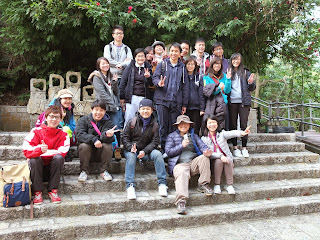Polly Ho
The November reading was a special one
as we moved the arena to Goethe Institut. This session was a joint
collaboration between the Goethe Institut, Fleurs des Lettres (字花) and Kubrick Poetry.
Our guest Lydia Daher is a young German
poet and songwriter. At the beginning of the reading, she made it clear that
she considered herself first to be a poet more than a musician, and that music
was only a platform for her to express her ideas. Her lyrics received warm
acclaim in the media because they fit well into popular music. She hoped
people like poetry even without music. Lydia likes poetry but she does not know
why she has to write it when most people see poetry as unimportant. She cannot
explain the reason. She just has to write it.
During the reading, Lydia read her
work November in German, Gordon read the Chinese version.
Other members in the audience also read their contributions, including Areo,
Haung Wai, Matthew Leung, Polly Ho and Tse Chui Yuk. Their contributions all
echoed the theme Autumn. Lydia commented autumn in Germany was too cold and so
her poems always carried a melancholic ambiance. She described it as “schweben”
(German: sway) as she did not want it to drift into heaviness and darkness.



One of the participants, Tse Chui Yuk
chose a poem named Death of a Poet by a Belgium poet, Maurice
Careme. The autumn theme in this poem was not very obvious as compared to
another poem by the same poet in which “he” is listening to the rainfall for
hours. “He” seems to stand from a distant perspective looking at the scene of
the rainfall. It cultivates a peaceful environment. So when compared to this
one, the feeling is very different. She thinks the poet is talking about
himself. In her understanding, the announcement of the death of a poet should
be the poet himself. This poem reflected the paradoxical situation of a poet
writing a poem, in the meantime, announcing the death of a poet who is probably
himself. She found it very amusing.
Polly shared a poem called Full
Moon in which depicts a journey of a couple at night. There is this
tension and emotional instability of the woman in the poem as she was uncertain
of the relationship. “She” finally found peace and felt home when she saw the
dog. Lydia was not very satisfied with it, “It is nice but it is not nice
because the woman is searching for something but at the end the dog gives her,
not the man.” It came as a surprise. At the end, Lydia thought she has to
accept it for life is like this. We are looking for something, then it gives us
something else. Something will fill the position at the passage of time.
After the reading, Lydia gave a
performance outside the Arts Centre. Students of Goethe Institut joined the
party and they enjoyed Lydia’s performance. Autumn is not as cold as it sounds.
(photos by Paul Wan)


























